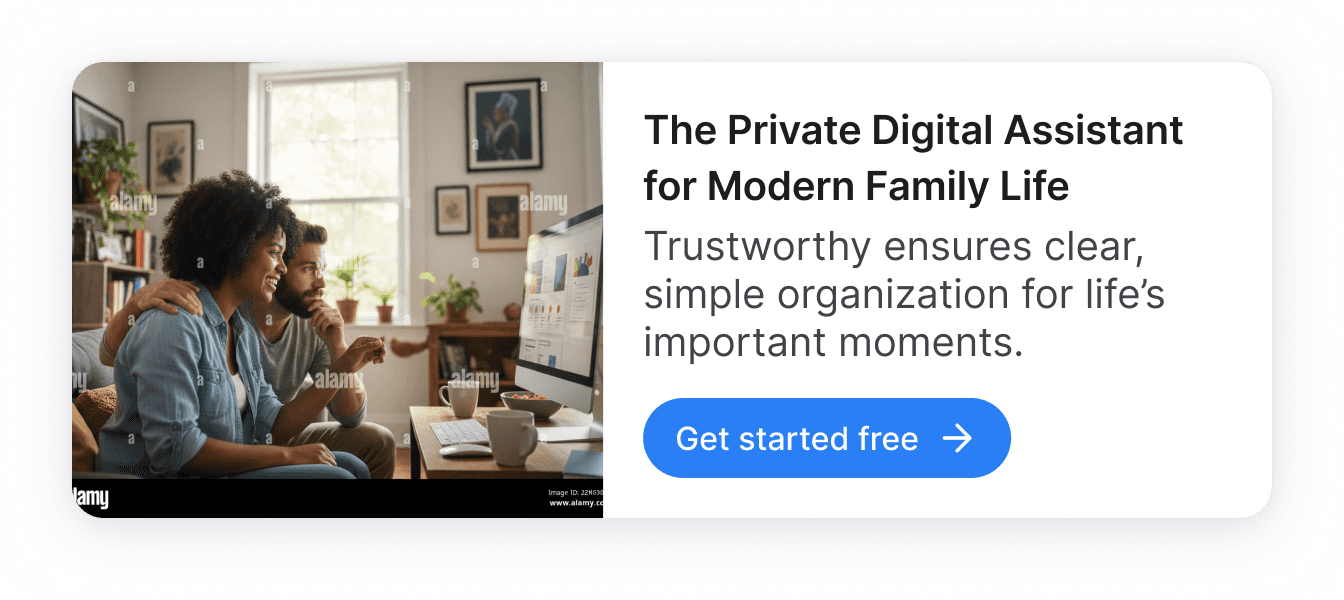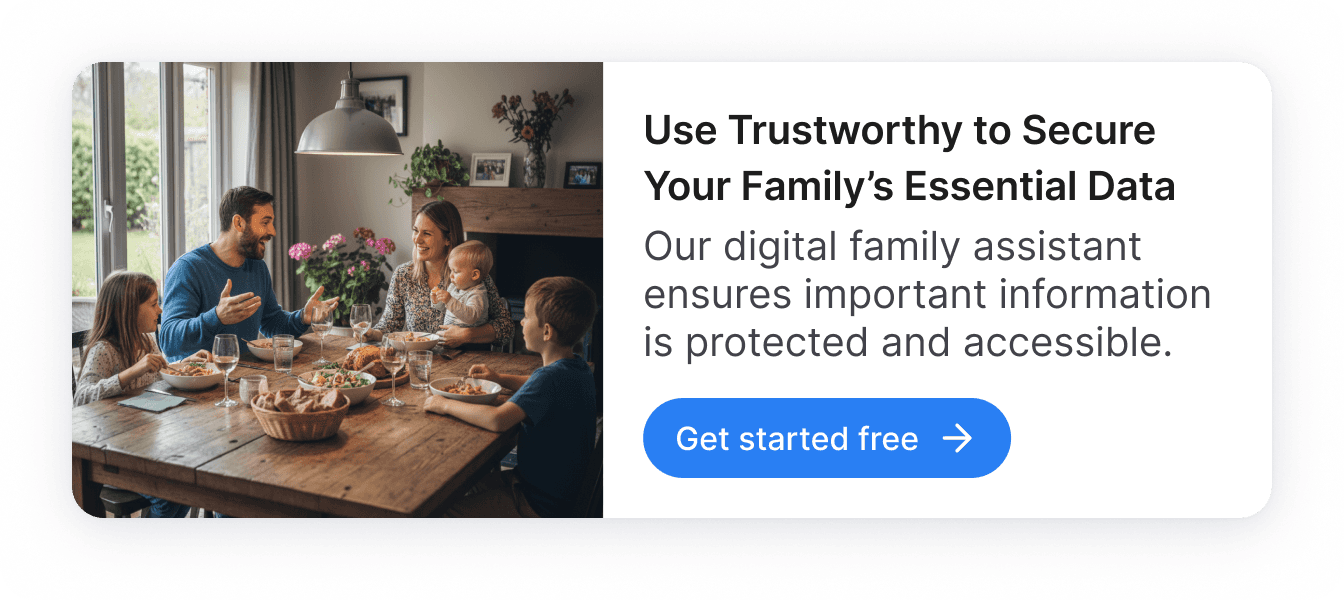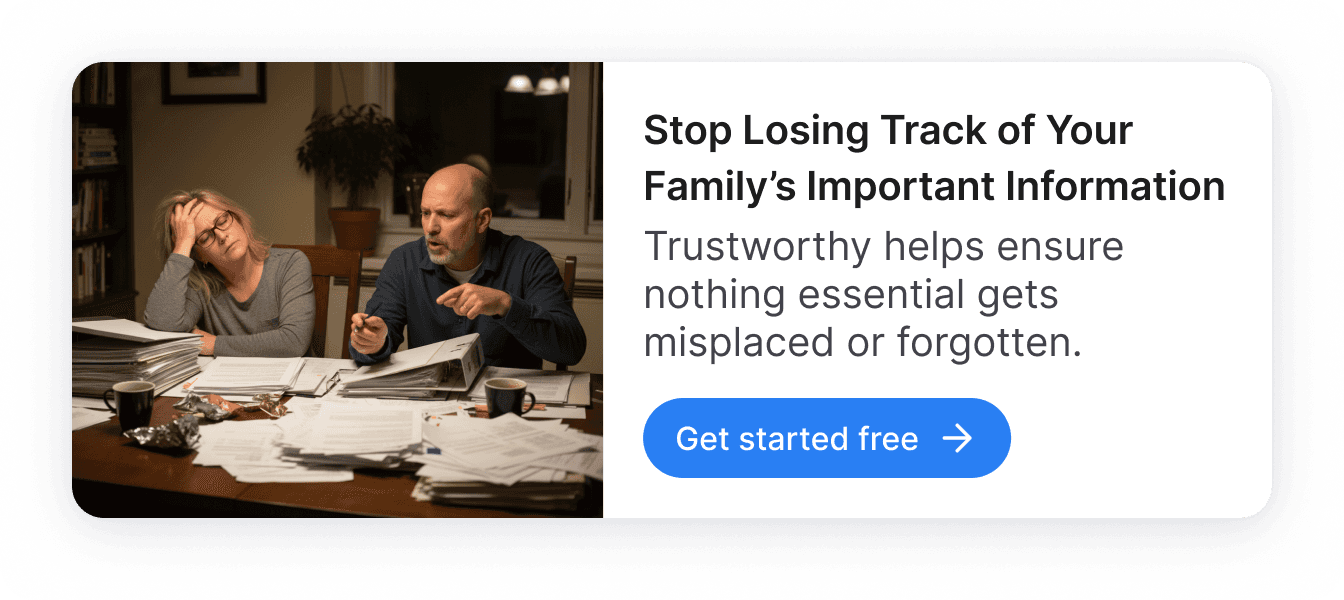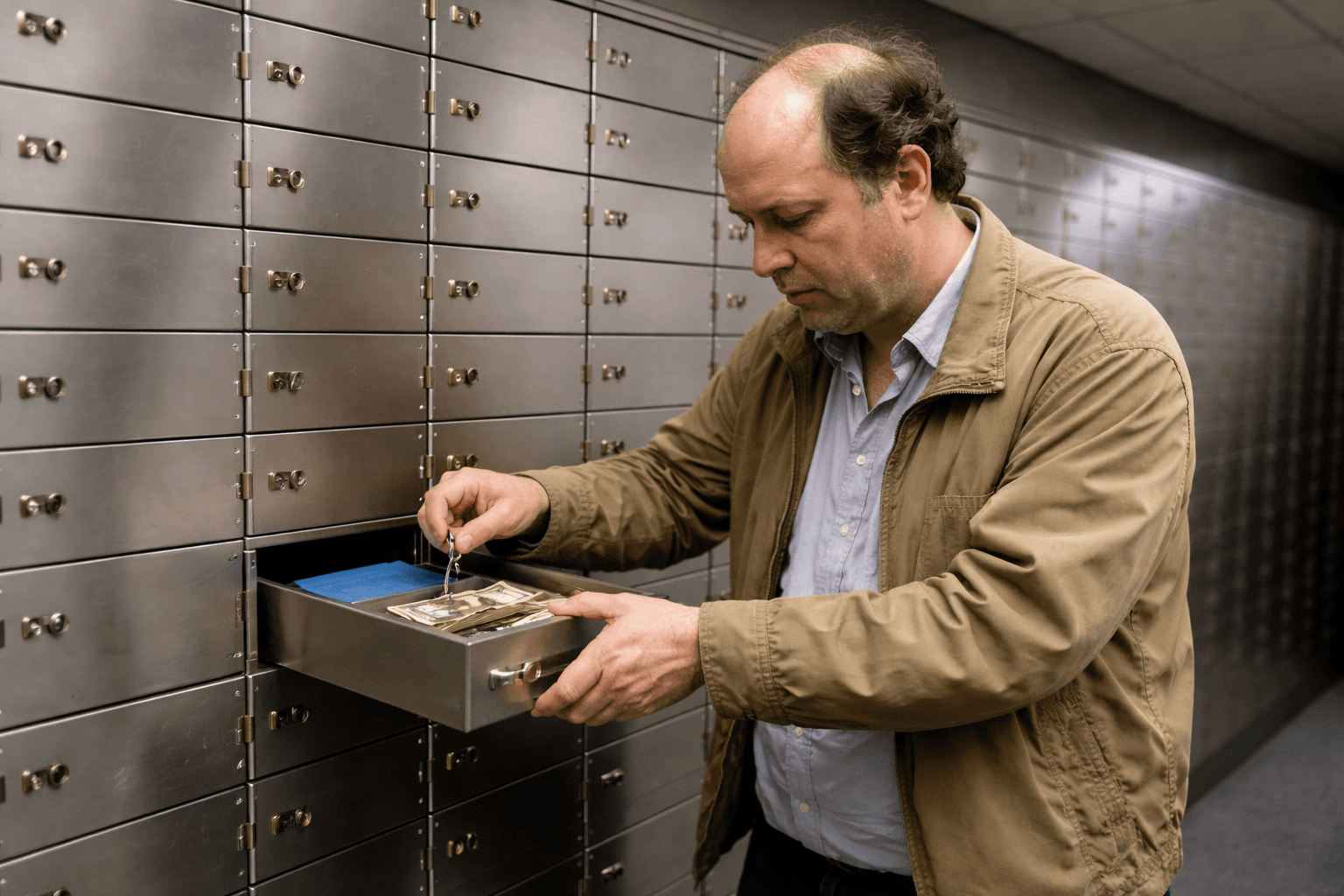
Best Safety Deposit Box Alternatives
|
Larry Li
Trustworthy's digital family assistant keeps your important information secure, private, and accessible. Watch to learn more.
Key Takeaways
Alternatives focus on reducing the access limitations of safety deposit boxes.
Some options allow documents to be retrieved without noting bank hours or location.
Improved access often involves different security or control trade-offs.
Choosing an alternative depends on how often documents must be accessed.

Safety deposit boxes aren’t the best storage solution for everyone. Advancements in technology have created more innovative and secure ways to keep sensitive documents and information safe.
But what are the best safety deposit box alternatives?
Trustworthy is an online storage platform that helps families manage documents securely. With Trustworthy, you can safely upload family IDs, insurance documents, bank account information, and much more. You can then access the documents whenever you need them while also sharing access with your loved ones.

There are dozens, if not hundreds, of safety deposit box alternatives, but I’ve narrowed the list down to 5. Through my own testing, I chose the best alternatives and broke each of them down in this guide.
Having your sensitive information fall into the wrong hands is a nightmare, and you can completely avoid it by using the best safety deposit box alternative.
In this guide, I’ll discuss:
The 4 reasons you should look for a safety deposit box alternative
What makes a good alternative to a safety deposit box
The 5 best safety deposit box alternatives
4 Reasons to Look for a Safety Deposit Box Alternative
Safety deposit boxes have been around since the 1800s and have been a useful storage tool in less technological times. However, they are not as effective and secure as most people think.
Let’s discuss 4 reasons why you should look for a safety deposit box alternative.
1. Lack of Loss Coverage
Contrary to popular belief, items stored in a safety deposit box are not covered by the bank or the Federal Deposit Insurance Corporation (FDIC). Therefore, if the items in your safety deposit box are stolen, damaged, or destroyed, you won’t be compensated for the losses that occur.
The FDIC only insures deposits in deposit accounts at insured institutions, and a safety deposit box is not a deposit account. Furthermore, financial institutions rarely insure the contents in their safe deposit boxes.
This means you’ll need to talk to your renter’s or homeowner’s insurance agent to receive coverage on the items in your safety deposit box. Doing so will add another fee on top of the annual fee you pay to rent your safe deposit box.
As you can see, safety deposit boxes aren’t truly “safe”. Moreover, the lack of loss coverage with safety deposit boxes means that storing valuable items in them is risky and anxiety-inducing.

2. Accessibility
You can only access your safety deposit box during the hours when the financial institution is open. Even so, you may need to also wait for an employee to help you physically access your safe deposit box. If your bank is far away from your home as well, this becomes highly inconvenient.
The lack of easy accessibility is a significant challenge with safety deposit boxes. As a result, there is always the potential for an unplanned emergency to take place where you may need to access an item in your safety deposit box. If this happens, you will need to wait until the bank opens.
Furthermore, if your bank branch shuts down, it can take a long time for your bank to transfer your box to another location. If your passports are stuck in your safety deposit box and you have an international flight planned, you may need to cancel your travels.
With Trustworthy, you have access to your most important documents at any time and you can add trusted family members or friends as collaborators so they do as well. You can edit or revoke their access levels at any time.
3. Vulnerable to Damage
Although banks are secure structures, they aren’t completely protected from natural disasters. If the bank floods or tears down because of a hurricane or tornado, you will potentially never see your safe deposit box items again. Banks aren’t fireproof either. If the bank catches fire, your valuables have a chance to burn and turn into ashes.
Safe deposit boxes are typically kept in bank vaults that are built to withstand natural disasters. But if you live in an area that’s prone to hurricanes or tornadoes, there’s still a high chance your safety deposit box gets damaged. As I mentioned earlier, your safety deposit box contents aren’t insured or covered when disasters strike.

4. Difficult Postmortem Access
If you keep your will or other postmortem documents in a safety deposit box, it will be difficult for your loved ones to access them after you pass away. They will need to go through a judge and receive a court order to open your safety deposit box.
This is why you shouldn’t store these types of documents inside a safety deposit box. The only way to prevent this inconvenience is to share access to your safety deposit box prior to death. However, the person you share access with will have access to all the contents in your safety deposit box.
Therefore, another problem arises as you may not want the loved one to have access to everything inside your safe deposit box.
Trustworthy allows you to customize the access level for each individual you invite as a collaborator. For example, your accountant can only have access to your finances and your estate lawyer can only see your estate planning documents.
What Makes a Good Alternative to a Safety Deposit Box?
At this juncture, you likely realize that a safety deposit box isn’t the best place to store your valuables. A good alternative to a safety deposit box eliminates all the risks and challenges that a safe deposit box faces.
An alternative solution will:
Offer best-in-class security
Have 24/7 accessibility
Be invulnerable to damage from natural disasters
Offer convenient access to your loved ones
Keep everything organized and easy to find
Most of all, a good alternative will remove all the anxiety that comes with storing your items in a safety deposit box.

Safety Deposit Box Alternatives
Instead of using a safety deposit box, here are alternatives to try out:
1. Trustworthy
Trustworthy is a highly secure cloud-based storage platform that helps families manage, curate, and securely share sensitive information. Keeping track of all your documents and organizing everything is a significant challenge many people face. Trustworthy is a platform that makes this process fun and straightforward.
With a beautiful and easy-to-use interface, Trustworthy guides you through a series of steps to upload and organize your information. It’ll offer recommendations on what you should add to your account, but you can choose to import anything.
You can also outsource tasks to loved ones or professionals such as estate planners, accountants, and financial advisers. This way, they can help you fill in important information and keep everything up to date.
Trustworthy is the best safety deposit box alternative to store:
Personal ID numbers (social security, passport, driver's license, etc.)
Bank account information
Account passwords
Property documents
Insurance documents
Pension and retirement plans
Health and medical benefits
Wills
And much more

Key Features
Here’s precisely why Trustworthy is the best safety deposit box alternative:
Paperless System and Accessibility
Paper documents are prone to getting destroyed or lost. It can be challenging or even impossible to replace them. For this reason, I recommend keeping a digital copy of all of your sensitive documents.
Trustworthy is an online service that keeps your valuable information safe, secure, and accessible. With the Trustworthy iOS mobile app, you can access your documents whenever and wherever you are. You can also use the browser website on your computer or Android device.
For instance, if you need access to your partner’s passport number and they’re not available to tell you, simply hop on to Trustworthy’s secure platform to find it. Trustworthy offers a convenient way to access important information like your social security number, the title deed to your home, and much more.
Security
Trustworthy offers advanced security features like AES 256-bit encryption, biometric security, YubiKey, and granular sharing permission. You will also need to use two-factor authentication, which means you can only log in via:
SMS text message
Biometric authentication
Hardware security keys
Authenticator apps
Recent research suggests that your accounts are 99.9% less likely to be compromised if you use two-factor authentication. Trustworthy requires two-factor authentication to protect your account.
Specifically designed to protect from breaches and additional threats, Trustworthy works intelligently to keep your information safe. Trustworthy’s team works with security experts and auditors to ensure the storage platform exceeds industry standards.
A few more Trustworthy security certifications include:
HIPAA compliance
McAfee TrustedSite Certified Secure
Norton Secured by Verisign
BBB Accreditation
You can rest assured that all of your sensitive documents and information are fully safe and secure inside the platform. Trustworthy will also never share or sell your family’s information.
Organization
In the information-heavy world we live in today, it’s a struggle to manage and organize all of our documents and sensitive information. Luckily, Trustworthy offers a way to keep everything neatly organized and easy to find.
Inside Trustworthy’s intuitive platform, there are sections for:
Family IDs
Property
Insurance
Emergency planning
Family archives
Bank accounts
Passwords
Once you upload your document to the appropriate section, you’ll be able to find it with ease in the future. This means you don’t have to keep your family documents stored in multiple physical and digital locations. Instead, you can use Trustworthy to ensure your most essential information is kept in one well-organized cloud-based storage system.
Trustworthy also features customizable templates so you can organize your information in a way that’s most optimal for you and your family.

Sharing
One of the most important features Trustworthy offers is its sharing capabilities. With Trustworthy, you can choose who has access to which documents. For instance, you can share access to your family photo album with your entire family but only share access to your bank account information with your partner.
In addition, you can connect advisors such as your financial planner, accountants, or lawyers to Trustworthy. This way, they can contribute information to important documents whenever necessary.
Postmortem Procedures
As I mentioned earlier, accessing a loved one’s safety deposit box after they pass away is difficult and confusing. It’s even more challenging to access a loved one's bank account, life insurance policy, and gain access to critical information after they pass away.
Fortunately, you can upload all of this information to Trustworthy and share access with your most trusted loved ones. This way, they know your postmortem wishes and have a plan and instructions to maneuver forward if worse comes to worst.
Once you sign up for Trustworthy, a Expert team will guide you through the Estate Documents section of your dashboard and help you gather the appropriate documents to share with an estate planning attorney. Trustworthy will also match you with estate planners and make sure you understand which procedures to tackle.
Pros
Simple and intuitive interface for maximum ease of use
Advanced security tools
Premium sharing functionality
Convenient accessibility
Coherent organization
Personalized reminders on soon to expire documents
Helpful expert service and guidance
All-in-one cloud-based storage platform
Suitable for families and businesses
2. Everplans
Everplans is a digital archive storage platform that offers enhanced security technology. This platform helps you store, organize, and share important information such as insurance and legal documents.
Key Features
Offers enterprise services for professionals like Certified Public Accountants (CPAs)
Step-by-step guidance in gathering the correct documents and information
Access to thousands of relevant guides, checklists, and articles
Ability to share your plan with family members, loved ones, and trusted advisors
Pros
Affordable pricing
Industry-leading security technology
HIPAA and SOC II Compliance
Cons
Minimal customer support
Slimmed-down storage features compared to Trustworthy
3. OneDrive
OneDrive is a cloud storage solution from Microsoft that lets you upload and access files from desktop or mobile. This platform integrates seamlessly with Microsoft Office and offers a family plan that allows up to 6 people and 1 TB of cloud storage.
Key Features
Offers a personal vault where you can store sensitive information
Pros
Great for collaborating and sharing Microsoft documents that aren’t sensitive
Offers expansive storage space for family pictures
A very simple storage solution
Cons
Files stored outside of the personal vault are not as secure
Cannot share files directly from the personal vault
Not the best platform to store and share sensitive information
4. Sync
Sync is an intuitive cloud storage solution that offers a large amount of storage. This platform comes with end-to-end encryption that keeps your sensitive documents safe and secure.

Key Features
Offers 256-bit AES encryption
Features a vault where you can store your most sensitive documents
Easy file restoration
Simple file and folder sharing
Pros
Simple, affordable, and secure
Access documents from anywhere using a mobile phone
Extended file history
Cons
No third-party apps integration
Limited customer support options
Syncing can be slow
Frequently Asked Questions
What Can I Use Instead of a Safety Deposit Box?
You can store physical items inside of a home fireproof safe. But, for documents, passwords, and important information, you can use a digital storage platform like Trustworthy. You can scan your sensitive documents and then upload them to Trustworthy’s highly secure storage cloud. This way, you can access them at any time.
Does the Bank Know What's in Your Safety Deposit Box?
The bank does not know what’s in your safety deposit box. When you deposit your items in the safety deposit box for the first time, you’ll be taken to a private room where you’ll be alone. The bank won’t ask or verify the contents you place inside your safe deposit box.
Is It Legal to Keep Cash in a Safety Deposit Box?
Although it’s legal to keep cash inside of a safety deposit box, it’s not recommended. Since the contents inside the box aren’t insured by the bank or the FDIC, you won’t be compensated if the cash is stolen, missing, or destroyed. For this reason, I recommend keeping cash inside of your bank account.

Final Thoughts
I hope this guide was useful in finding the best safety deposit box alternative. Trustworthy is the clear winner because it offers a comprehensive set of features that keeps your information secure and organized. Everplans is an affordable family storage solution, but it doesn’t offer as many attributes as Trustworthy.
Trustworthy checks all the boxes of what makes a good alternative to a safety deposit box and provides an innovative solution to the modern problems of disorganized files and information overload. Try it for free.
Other Safety Deposit Box Resources
We’d love to hear from you! Feel free to email us with any questions, comments, or suggestions for future article topics.













